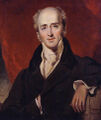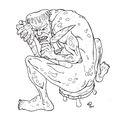Template:Selected anniversaries/July 17: Difference between revisions
No edit summary |
No edit summary |
||
| (15 intermediate revisions by the same user not shown) | |||
| Line 1: | Line 1: | ||
<gallery> | <gallery> | ||
|| | || *** DONE: Pics *** | ||
|| | ||1588: Mimar Sinan dies ... architect and engineer, designed the Sokollu Mehmet Pasha Mosque and Süleymaniye Mosque. No DOB. Pic. | ||
|| | ||1675: Isaac Watts born ... Christian minister (Congregational), hymn writer, theologian, and logician. Pic: statue. | ||
|| | ||1698: Pierre Louis Maupertuis born ... mathematician and philosopher. No DOB. Pic. | ||
||1839 | ||1791: Members of the French National Guard under the command of General Lafayette open fire on a crowd of radical Jacobins at the Champ de Mars, Paris, during the French Revolution, killing scores of people. | ||
||1794: John Roebuck dies ... chemist and businessman. No DOB. Pic search. | |||
||1827: Frederick Abel dies ... chemist and engineer ... explosives, smokeless powder, electrical fuses. Pic. | |||
||1839: Ephraim Shay born ... engineer, invented the Shay locomotive. Pic search. | |||
File:Charles Grey, 2nd Earl Grey by Sir Thomas Lawrence copy.jpg|link=Charles Grey, 2nd Earl Grey (nonfiction)|1845: [[Charles Grey, 2nd Earl Grey (nonfiction)|Charles Grey, 2nd Earl Grey]] dies. His government saw the abolition of slavery in the British Empire. | File:Charles Grey, 2nd Earl Grey by Sir Thomas Lawrence copy.jpg|link=Charles Grey, 2nd Earl Grey (nonfiction)|1845: [[Charles Grey, 2nd Earl Grey (nonfiction)|Charles Grey, 2nd Earl Grey]] dies. His government saw the abolition of slavery in the British Empire. | ||
|| Archibald Henderson | ||1877: Archibald Henderson born ... professor of mathematics who wrote on a variety of subjects, including drama and history. He is well known for his friendship with George Bernard Shaw. Pic. | ||
||1894 | ||1894: Georges Lemaître born ... priest, astronomer, and cosmologist. Pic. | ||
||1910 | ||1910: Frank Olson born ... chemist and microbiologist. Pic search. | ||
File:Culvert Origenes.jpg|link=Culvert Origenes|1911: Writer and philosopher [[Culvert Origenes]] criticized for his unpatriotic opinions. | File:Culvert Origenes.jpg|link=Culvert Origenes|1911: Writer and philosopher [[Culvert Origenes]] criticized for his unpatriotic opinions. | ||
| Line 22: | Line 28: | ||
File:Henri Poincaré.jpg|link=Henri Poincaré (nonfiction)|1912: Mathematician, physicist, and engineer [[Henri Poincaré (nonfiction)|Henri Poincaré]] dies. He made many original fundamental contributions to pure and applied mathematics, mathematical physics, and celestial mechanics. | File:Henri Poincaré.jpg|link=Henri Poincaré (nonfiction)|1912: Mathematician, physicist, and engineer [[Henri Poincaré (nonfiction)|Henri Poincaré]] dies. He made many original fundamental contributions to pure and applied mathematics, mathematical physics, and celestial mechanics. | ||
||1917: Giuseppe Veronese dies ... mathematician. Pic. | |||
|| | File:Gordon Gould.jpg|link=Gordon Gould (nonfiction)|1920: Physicist and academic [[Gordon Gould (nonfiction)|Gordon Gould]] born. He will invent and name the laser. | ||
|| | ||1922: Heinrich Rubens dies ... physicist. He is known for his measurements of the energy of black-body radiation which led Max Planck to the discovery of his radiation law. This was the genesis of quantum theory. Pic. Better search: https://www.google.com/search?q=heinrich+rubens | ||
File: | ||1927: Mathematician Maria Wonenburger born ... She will work on group theory, the theory of Lie algebras, and the orthogonal group and its corresponding projective group. Pic. | ||
File:Port Chicago disaster.jpg|link=Port Chicago disaster (nonfiction)|1944: The [[Port Chicago disaster (nonfiction)|Port Chicago disaster]]: Munitions detonate while being loaded onto a cargo vessel bound for the Pacific Theater of Operations, killing 320 sailors and civilians and injuring 390 others at the Port Chicago Naval Magazine in Port Chicago, California, United States. | |||
File:William James Sidis 1914.jpg|link=William James Sidis (nonfiction)|1944: Mathematician and anthropologist [[William James Sidis (nonfiction)|William James Sidis]] dies. He became famous first for his precocity and later for his eccentricity and withdrawal from public life. | |||
||1956: Bodo von Borries dies ... physicist and academic, co-invented the electron microscope. | |||
||1958: Henri Farman dies ... aviator and aircraft designer and manufacturer with his brother Maurice Farman. Pic. | |||
|| | ||1962: Nuclear weapons testing: The "Small Boy" test shot Little Feller I becomes the last atmospheric test detonation at the Nevada National Security Site. | ||
|| | ||1964: Operation Snowball was a conventional explosive test to obtain information on nuclear weapon detonations run by the Defence Research Board with participation from the United Kingdom and United States. A detonation of 500 short tons (454 t) of TNT was used to study the resulting phenomena. The test was held at the Suffield Experimental Station in Alberta and was the largest ever man-made, non-accidental explosion in Canada. The test was also the first of its kind using a stacked TNT block hemisphere of such magnitude, a method repeated in six subsequent tests such as Operation Sailor Hat and Prairie Flat. The test allowed verifying predicted properties of shock and blast and determining its effect on a variety of military targets at varied distances from ground zero. Pic. | ||
||1975: Donald Bruce Gillies dies ... mathematician and computer scientist, known for his work in game theory, computer design, and minicomputer programming environments. Pic. | |||
||1975: Apollo–Soyuz Test Project: An American Apollo and a Soviet Soyuz spacecraft dock with each other in orbit marking the first such link-up between spacecraft from the two nations. | |||
||1980: Boris Delaunay dies ... mathematician and academic. Pic. | |||
|| | ||1982: Mihai Pătrașcu born ... computer scientist. Pătraşcu’s work was concerned with fundamental questions about basic data structures. Pic. | ||
|| | ||1984: Yakov Geronimus dies ... mathematician known for contributions to theoretical mechanics and the study of orthogonal polynomials. The Geronimus polynomials are named after him. Pic: https://www.math.technion.ac.il/hat/people/pix/geronimus.jpg | ||
|| | ||1993: Adolph-Andrei Pavlovich Yushkevich dies ... historian of mathematics, leading expert in medieval mathematics of the East and the work of Leonhard Euler. Pic. | ||
|| | ||1998: Robert Alden Cornog dies ... physicist and engineer who helped develop the atomic bomb and missile systems from the Snark to the Minuteman. Pic. | ||
|| | ||1998: Michael James Lighthill dies ... applied mathematician, known for his pioneering work in the field of aeroacoustics. Pic. | ||
|| | ||2003: David Christopher Kelly dies by suicide... scientist and authority on biological warfare, anthrax. Pic. | ||
||2003 | ||2003: Walter Zapp dies ... inventor, invented the Minox. Pic. | ||
||Isabella Grigoryevna Bashmakova | ||2005: Isabella Grigoryevna Bashmakova dies ... historian of mathematics. Pic. | ||
||2015: Hartley Rogers Jr. dies ... mathematician who worked in recursion theory, and was a professor in the Mathematics Department of the Massachusetts Institute of Technology. The Rogers equivalence theorem is named after him. Pic: http://www.legacy.com/obituaries/bostonglobe/obituary.aspx?n=hartley-rogers&pid=175517283 | |||
</gallery> | </gallery> | ||
Latest revision as of 10:12, 7 February 2022
1845: Charles Grey, 2nd Earl Grey dies. His government saw the abolition of slavery in the British Empire.
1911: Writer and philosopher Culvert Origenes criticized for his unpatriotic opinions.
1912: Mathematician, physicist, and engineer Henri Poincaré dies. He made many original fundamental contributions to pure and applied mathematics, mathematical physics, and celestial mechanics.
1920: Physicist and academic Gordon Gould born. He will invent and name the laser.
1944: The Port Chicago disaster: Munitions detonate while being loaded onto a cargo vessel bound for the Pacific Theater of Operations, killing 320 sailors and civilians and injuring 390 others at the Port Chicago Naval Magazine in Port Chicago, California, United States.
1944: Mathematician and anthropologist William James Sidis dies. He became famous first for his precocity and later for his eccentricity and withdrawal from public life.





